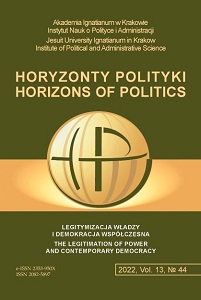A conceptual framework for assessing power and governance in contemporary democracy
A conceptual framework for assessing power and governance in contemporary democracy
Author(s): Mukesh Shankar BhartiSubject(s): International Law, Governance, Government/Political systems, International relations/trade, Electoral systems, Politics and law, Peace and Conflict Studies
Published by: Uniwersytet Ignatianum w Krakowie
Keywords: Modern democracy; power and governance; government and politics; international organisation; populism;
Summary/Abstract: RESEARCH OBJECTIVE: The objective of the article is to define the conceptual framework of the contemporary governmental system and its style of functionality to strengthen democratic values, norms, and the rule of law. The purpose of the article is to elaborate governance that shares state power to facilitate the democratic rights of the people in the contemporary world. THE RESEARCH PROBLEM AND METHODS: This article aims to analyse the power and governance in the current structure of democracy. The article evaluates the dynamics of contemporary democracy and how the government shapes the power for better governance. Future research highlights the conceptual framework of the qualitative approach and relies on discourse analysis to find out the outcomes of this study. The study uses a theoretical approach to examine contemporary governance, different approaches and how to build socio political cooperation. THE PROCESS OF ARGUMENTATION: It discusses various aspects of modern democracy in the context of the governability of those who hold power. Furthermore, the article argues how the states are shaping modern democracy. How a new political order pioneers the norms of the state through its governance. What is the legitimate principle of the work for the new political order? RESEARCH RESULTS: As a result, the article tries to find out that modern democracy is running under a populist government in various countries in the world. The emergence of ultra right wing power groups diminished the norms of liberal democracy. CONCLUSIONS, INNOVATIONS, AND RECOMMENDATIONS: The article highlights the points as a conclusion of democracy facing many challenges in the new populist governance worldwide. The contemporary global communities are trying to make governance for peace, prosperity, and respect for the humanities but and on the other hand, international communities are failed in some places i. e. Afghanistan. This discussion recommends about international communities to create an environment for cooperation among different nation states to make an international partnership for the establishment of peace, cooperation for the well being of the people, and stop conflicts and recurring wars.
Journal: Horyzonty Polityki
- Issue Year: 13/2022
- Issue No: 44
- Page Range: 31-46
- Page Count: 16
- Language: English

